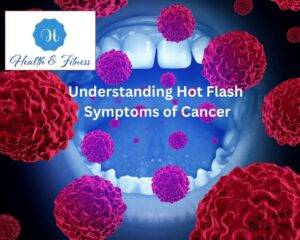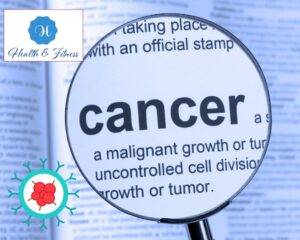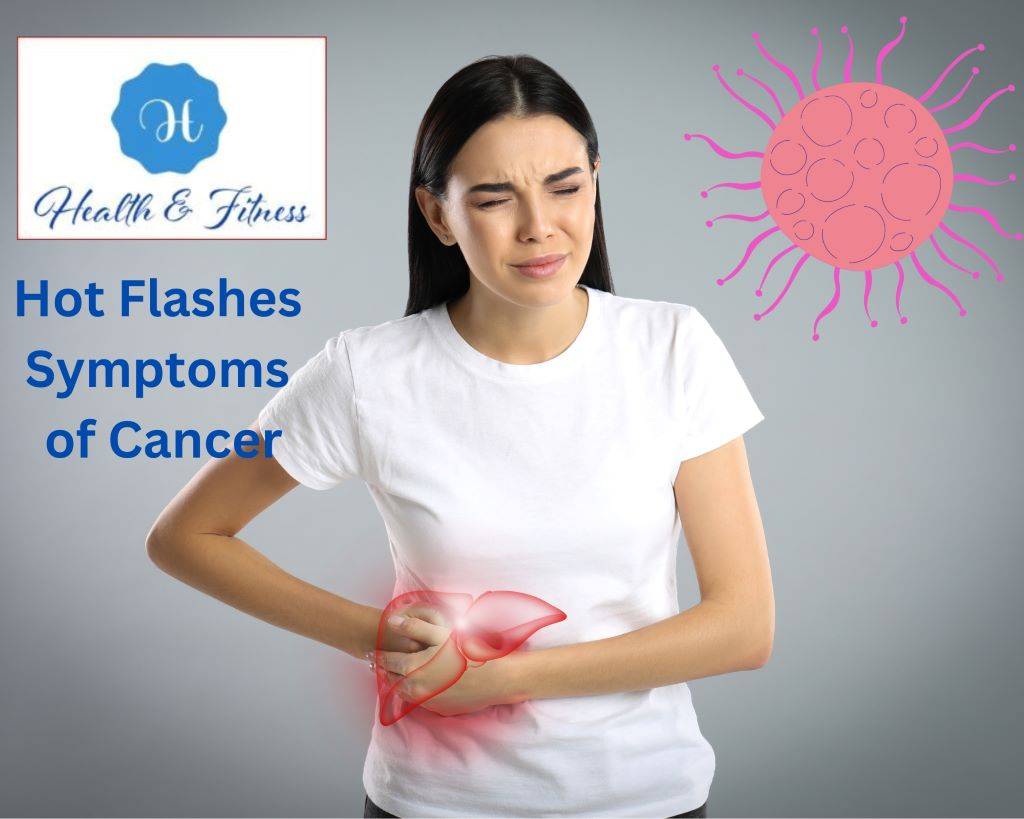Hot Flashes Symptoms of Cancer: What You Need to Know
Learn what you need to know about hot flashes symptoms of cancer. Understand the signs, causes, and when to seek medical advice.
Introduction to Hot Flashes Symptoms of Cancer
Discover crucial information about hot flashes, their potential link to cancer symptoms, and what you need to know. Stay informed about the warning signs, risk factors, and when to seek medical attention. Empower yourself with knowledge for better health.
Hot flashes are those unexpected surges of heat that can be accompanied by sweating, a racing heart, and even chills. They are most commonly associated with menopause, but did you know that hot flashes can also be a cancer symptom? In this blog post, we’ll delve into the world of hot flashes and explore their connection to cancer. We’ll discuss the reasons behind their occurrence, the types of cancer they might signal, and what you can do to manage them. Let’s dive in!
Understanding Hot Flash Symptoms of Cancer

What are the Hot Flashes Symptoms of Cancer?
Hot flashes are sudden, intense sensations of warmth that can spread throughout the body, often accompanied by sweating and a rapid heartbeat. They typically last for a few minutes and can occur at any time of the day or night. Hot flashes may be a cancer symptom or therapy adverse effect.
What Causes Hot Flashes Symptoms of Cancer?

Before we explore the link between hot flashes and cancer, let’s first understand what hot flashes are and why they happen. Hot flashes are sudden feelings of warmth that can be localized to a specific body area, like the face, neck, or chest, or they can spread throughout your body. They can last anywhere from 30 seconds to several minutes and may be followed by other signs like sweating, redness, and a rapid heartbeat. Hormonal fluctuations in the body primarily cause hot flashes. During menopause, estrogen levels drop, which can lead to a disruption in the body’s temperature regulation system. Hormonal imbalances may enlarge blood vessels near the skin, causing hot flashes.
The Cancer Connection: How Hot Flashes May Signal Cancer
While menopause is the most common reason behind hot flashes, it can also be a symptom of certain types of cancer. Here’s what you need to know:
Hormone-Sensitive Cancers
Some forms of cancer, such as breast and prostate cancer, are hormone-sensitive. This means that hormone levels influence the growth of these cancers in the body. For example, estrogen promotes certain breast cancers and testosterone in some prostate cancers. Cancer treatments for these hormone-sensitive cancers often involve hormone therapy. This therapy aims to inhibit the production of hormones or block their effects on cancer cells. This can lead to a change in hormone levels, which can cause hot flashes. Hot flashes are a common side effect of hormone therapy for both breast and prostate cancer.
Carcinoid Syndrome
Carcinoid syndrome is rare when a neuroendocrine tumour (NET) releases many hormones and other substances into the bloodstream. These substances can cause a variety of symptoms, including hot flashes. NETs are most commonly found in the gastrointestinal tract (stomach, intestines, appendix, and rectum) and the lungs but can also occur in other body parts. Carcinoid syndrome is usually associated with advanced NETs, as the symptoms typically appear when the tumor has spread to the liver or other body parts. Besides hot flashes, other symptoms of carcinoid syndrome can include facial flushing, diarrhea, abdominal pain, and wheezing.
Paraneoplastic Syndromes
Paraneoplastic syndromes are a group of rare disorders that can occur when cancerous cells produce hormones or other substances that affect normal tissues and organs in the body. In some cases, these substances can cause hot flashes. For example, some lung cancers can secrete a hormone-like substance called adrenocorticotropic hormone (ACTH). High levels of ACTH can lead to an overproduction of cortisol, a hormone that helps regulate the body’s response to stress. This excess cortisol can cause symptoms similar to Cushing’s syndrome, including hot flashes.
Quelling the Fire: Managing Hot Flashes Symptoms of Cancer
If you’re experiencing hot flashes as a symptom of cancer or a side effect of cancer treatment, several strategies may help you manage them. Here are a few tips to help you stay relaxed and comfortable:
- Stay Hydrated: Drinking daily water helps control body temperature.
- Dress in Layers: Wearing lightweight, breathable clothing in layers can help you adjust to sudden temperature changes. Opt for natural fabrics like cotton, which can help wick away moisture and keep you cool.
- Keep Cool: Use fans, air conditioning, and cool packs to help lower the temperature of your environment.
- Practice Relaxation Techniques: Deep breathing exercises, meditation, and Hot flashes may be reduced by gradual muscular relaxation, progressive relaxation, and progressive relaxation.
- Avoid Triggers: Certain lifestyle factors can exacerbate hot flashes, such as smoking, alcohol consumption, and caffeine intake. Reducing or eliminating these factors may help alleviate your symptoms.
- Talk to Your Doctor: If your hot flashes are severe and affect your quality of life, talk to your healthcare provider. They may recommend medications or other interventions to help manage your symptoms.
Hot flashes associated with types of cancers
Hot flashes can be associated with various types of cancer and their treatments. Some commons include:
- Breast cancer: Hormonal changes because of breast cancer or its treatments, such as chemotherapy, hormone therapy, or surgery, can lead to hot flashes. Hormone therapy, in particular, can cause a decrease in estrogen levels, which is a common trigger for hot flashes.
- Ovarian cancer: Ovarian cancer and its treatments, such as surgery to remove the ovaries or chemotherapy, can cause a sudden drop in estrogen levels, leading to hot flashes.
- Prostate cancer: Men with prostate cancer may experience hot flashes as a side effect of hormone therapy, which is used to lower testosterone levels. Lower testosterone levels can cause symptoms similar to menopause in women, including hot flashes.
- Endometrial cancer: Endometrial cancer and its treatments, such as surgery, radiation, or hormone therapy, can cause hormonal imbalances that may lead to hot flashes.
- Thyroid cancer: Thyroid cancer and its treatments can affect hormone levels and the body’s ability to regulate temperature, causing hot flashes.
Hot flashes are not a direct symptom of these cancers. Hot flashes may also happen from cancer therapies or hormonal changes. Consult your doctor if you have unanticipated hot flashes throughout cancer therapy. They can diagnose and counsel you. Seek medical help to treat heat flashes’ underlying causes. Additionally, seeking medical advice is crucial if the hot flashes suddenly increase in severity or intensity. Early detection and intervention can make a significant difference in cancer treatment outcomes.
Conclusion about Hot Flashes Symptoms of Cancer
Hot flashes are not just a symptom of menopause; they can also be a sign of cancer or a side effect of cancer treatment. Hormone-sensitive cancers, carcinoid syndrome, and paraneoplastic syndromes are some connections between hot flashes and cancer. While experiencing hot flashes alone is not a definitive indicator of cancer, paying attention to your body and discussing any changes or concerns with your healthcare provider is essential.
Suppose you’re experiencing hot flashes because of cancer or its treatment. In that case, there are strategies you can implement to help manage them, such as staying hydrated, dressing in layers, practicing relaxation techniques, and avoiding triggers. Don’t hesitate to contact your healthcare team for support and guidance on managing hot flashes and other cancer-related symptoms.
In conclusion, gaining knowledge about the potential connection between hot flashes and cancer is empowering. It enables you to manage this uncomfortable and sometimes distressing symptom effectively. It is crucial to take the necessary steps and seek appropriate medical attention. By listening to your body and staying proactive about your health, you can confidently navigate this aspect of your well-being. Consulting your healthcare provider with any concerns further ensures that you take the necessary steps for your overall health. Stay calm, stay informed, and prioritize your health!
Reference
American Cancer Society. (2021). Signs and Symptoms of Cancer. Retrieved from https://www.cancer.org/cancer/cancer-basics/signs-and-symptoms-of-cancer.html
National Cancer Institute. (2021). Hot Flashes and Night Sweats (PDQ) – Patient Version. Retrieved from https://www.cancer.gov/about-cancer/treatment/side-effects/hot-flashes-pdq
American Cancer Society. (2021). Breast Cancer Signs and Symptoms. Retrieved from https://www.cancer.org/cancer/breast-cancer/about/breast-cancer-signs-and-symptoms.html

Adel Galal is a health and wellness writer with over 30 years of experience studying and writing about health, fitness, nutrition, and healthy living. He is the founder of NextFitLife.com, where he shares practical, evidence-based guidance to support long-term health at any age. Adel’s mission is simple:
to help people make smarter health choices that fit real life, at any age.



